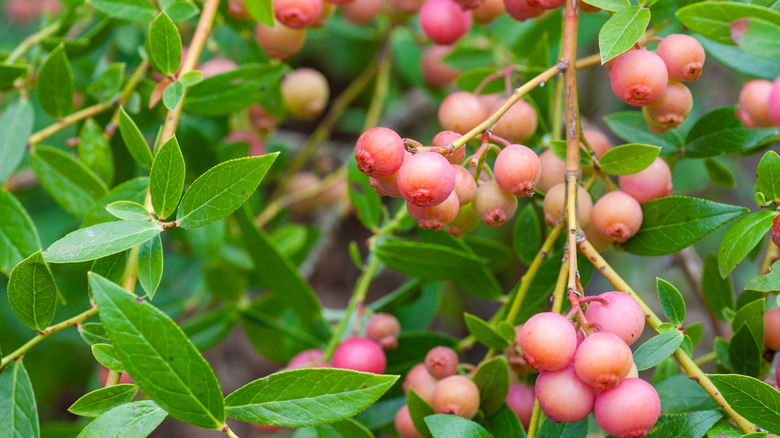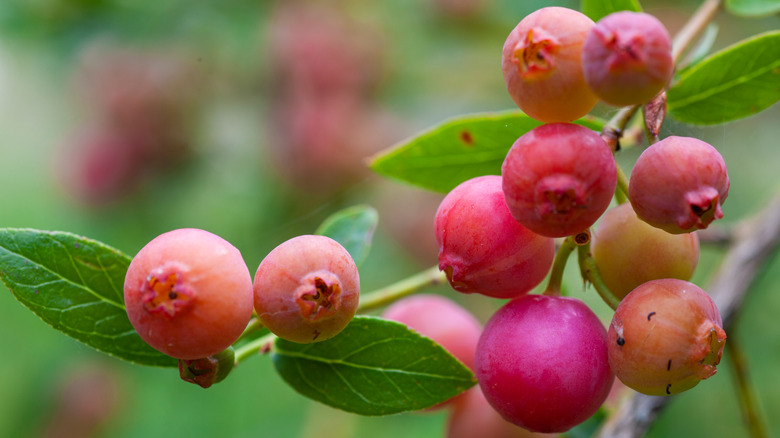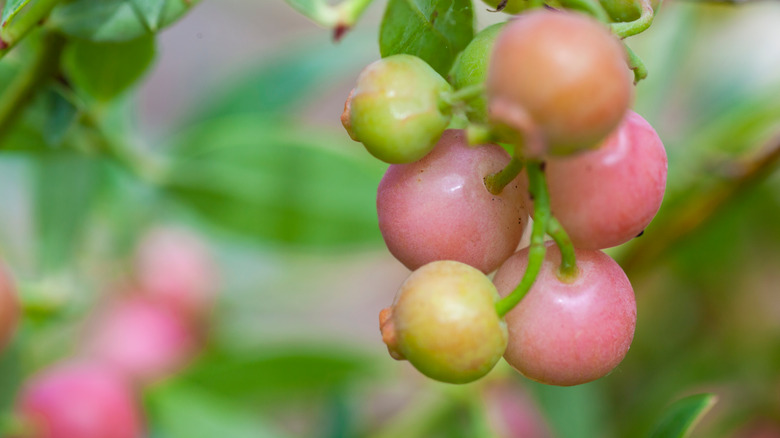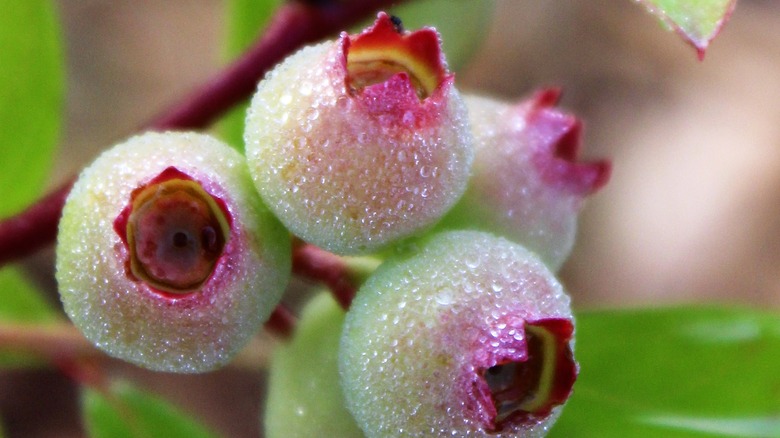What Are Pink Lemonade Blueberries And What Do They Taste Like?
You can have your pink lemonade and eat it, too! Wait, what? That's right. Pink lemonade isn't just a sweet and pretty summertime sipper. It's also a type of blueberry! Pink lemonade blueberries (Vaccinium 'Pink Lemonade') were developed by the U.S. Department of Agriculture in 1991 and "formally released" in 2005, though they didn't get their charming name until 2007. Over a decade later, these juicy pink gems are slowly gaining popularity among gardeners and making their way into the culinary world.
When USDA researchers initially introduced the new pink lemonade blueberries to American blueberry growers, they believed that the farmers would falsely assume the variety was simply an unripe version of the everyday blueberry (via Better Homes & Gardens). Today, pink lemonade blueberries are making a comeback. They're not only popular for their beauty and ornamental value, but they're also a hit for fruit fans that appreciate the many health benefits they provide to those who are lucky enough to taste them. Let's learn a little more about this rose-colored berry that's both gorgeous and delicious.
What are pink lemonade blueberries?
If you're looking to welcome a vivid new crop to your home garden and are not ashamed of being tickled pink, consider growing pink lemonade blueberries! Like pretty much every living thing on the planet, not all blueberries are created equal. Pink lemonade blueberries are a type of rabbiteye blueberry — a genus with a fitting name that pays homage to the color of some wild rabbits' reddish-pink irises, Horticulture Mag explains.
The pink lemonade blueberry shrub usually grows between four and five feet tall and wide, according to The Spruce. The fragrant pink lemonade blueberry flowers bloom in the late spring with small, bell-shaped, pinkish-white flowers. Then, in mid-to-late summer, the green berries that have taken shape from the sweet-smelling flowers ripen to become the iconic bright pink fruit that's good enough to eat right off the vine. During the autumn months when the weather gets cooler, pink lemonade blueberry plants sport a crisp red-orange foliage.
What do pink lemonade blueberries taste like?
Pink lemonade blueberries are a treat for both the eyes and the taste buds, adding vivid color and incomparable sweetness to every dish or bowl in which they grace their beauty. According to Gastro Obscura, these vividly colored blueberries are "almost tropical-tasting."
Pink lemonades taste about twice as sweet as your standard blueberries and have a "unmistakable lemony flavor" according to Specialty Produce, giving their name a meaning that stretches beyond just its pink appearance. These candylike gems are delicious when eaten fresh off the bush, mixed into pretty fruit salads, incorporated into muffins and desserts, or even used as a colorful garnish for various dishes and drinks. Unlike traditional blueberries, pink lemonades won't leave a dark stain on surrounding foods and surfaces — Specialty Produce notes they also make for a uniquely-hued jam or jelly.
Just like their blue-hued cousins, pink lemonade blueberries are super rich in antioxidants and are a good source of dietary fiber and vitamins C and K, per Specialty Produce.
Where can you buy pink lemonade blueberries?
Although it may be a bit tricky to find the pink lemonade variety of blueberries in your standard neighborhood grocery store, you can buy pink lemonade blueberries — or their seeds — on various specialty online marketplaces or at some cities' farmers markets to grow in your own home garden. For example, garden and plant site Burpee sells plants of them for $17.95. Online plant store One Green World also offers various sizes.
To bear the most luscious fruit, pink lemonade blueberries require lots of sunlight and acidic soil to flourish (via Backyard Food Growing). Pink lemonade blueberry bushes make an amazing gift for the gardening enthusiast or anyone who is an advocate of growing and eating enchanting, nutritious fruits right at home. Pink lemonade blueberries may look like they came straight out of a fairytale, but they're as real and lovely as they are succulent and wholesome.



